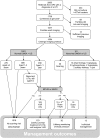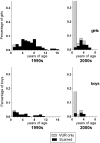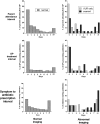Does prompt treatment of urinary tract infection in preschool children prevent renal scarring: mixed retrospective and prospective audits
- PMID: 24351607
- PMCID: PMC3963540
- DOI: 10.1136/archdischild-2013-304428
Does prompt treatment of urinary tract infection in preschool children prevent renal scarring: mixed retrospective and prospective audits
Abstract
Objective: To test whether active management of urinary tract infections (UTI) in young children by general practitioners can reduce kidney scarring rates.
Design: A comparison of two audits in Newcastle, of children aged <8 years, presenting with UTIs ; a retrospective audit of conventional management during 1992-1995 (1990s) versus a prospective audit of direct access management during 2004-2011 (2000s).
Main outcome measures: Kidney scarring rates, and their relationship with time-to-treat.
Results: Children with a first UTI in the 2000s compared to those in the 1990s, were referred younger, were half as likely to have a renal scar (girls OR 0.47, 95% CI 0.29 to 0.76; boys 0.35, 0.16 to 0.81), and were about 12 times more likely to have vesicoureteric reflux without scarring (girls 11.9, 4.3 to 33.5; boys 14.4, 4.3 to 47.6). In the 2000s, general practitioners treated about half the children at first consultation. Children who were treated within 3 days of their symptoms starting were one-third as likely to scar as those whose symptoms lasted longer (0.33, 0.12 to 0.72).
Interpretation: Most kidney defects seen in children after UTIs, are acquired scars, and in Newcastle, active management in primary care has halved this rate.
Keywords: prompt treatment; renal scarring; urinary tract infection; vesicoureteric reflux.
Figures




References
-
- Venhola M, Uhari M. Vesicoureteral reflux, a benign condition. Pediatr Nephrol 2009;24:223–26 - PubMed
MeSH terms
Substances
LinkOut - more resources
Full Text Sources
Other Literature Sources
Medical
